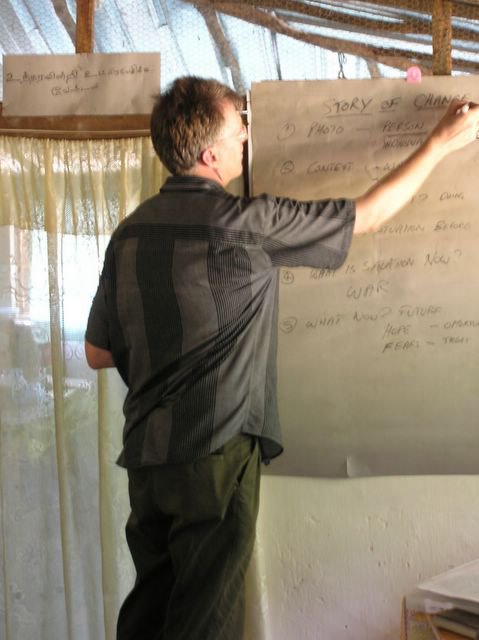
"I am Suresh Wasantha and am 23yrs, I live with my father and elder sister." Suresh, sitting on the extreme left of this picture, tells me a little about the experiencethat brought him to work for the Ekala Human Rights Centre.
I am here in Seduwa and Ekala, just a stones throw from the major Colombo international airport, to visit the Human Rights Centre established 3 years ago by one of CAFOD's partners. I met Suresh Wasantha who joined the Human Rights Centre over a year ago now. He had been employed in a rope factory in Ekala since leaving schools 5 years ago. The work conditions were poor a lack of toilet facilities, no drinking water. A worker who had been at the factory for 20 years had a basic salary of 3,500 in 2005 (about £20 per month) Women were also forced to do the night shift and overtime which was often not paid. During the working hours we also were supposed to have safety items but these were never provided. There was also no proper scale of holidays and no first aid facilities".
"In an emergency if someone was sick in the night there was no vehicle to get a patient to hospital, and it was then that we approached the Human Rights Centre to seek their advice" Suresh told me how a group of workers unhappy about their conditions gradually built up an active group agitating for change. The factory owner was Tamil and many Tamil estate women workers were employed in the factory but working under almost slave like conditions. Suresh is himself Tamil and was able to speak with the workers and help organise a workers association. Earlier a ttempts to establish a union had failed because people were so scared to be marked as organisers.
After Human Rights Day in Feb 2005 the JVP, a very left wing and nationalist group, established a union in the factory based on the conscientising work the Human Rights Centre had been doing but the Centre didn’t get involved directly. However having formed the Union the JVP organisers failed to take up the issues of the workers conditions successfully. 'I had been sacked before the JVP had organised the union and these were on trumped up charges because I had been organising the workers’. The JVP organised a strike and factory had to close and all the workers were dismissed. The strike was then called off but some workers then filed a case with the labour tribunal and again this was done with assistance from the Centre’s legal team. The case should be heard in February this month. '30 went on strike, 6 went back to work and 15 have filed the case' Suresh says 'We are a little more confidant now that we will get justice'.
“As a victim of injustice I feel the need of supporting young workers who have similar problems, including my old colleagues” Shuresh said “I hope to help make other workers aware of their rights and to improve my own knowledge on labour laws”.

No comments:
Post a Comment